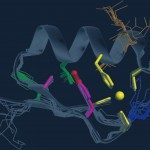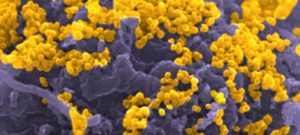Fabrice Agou received his doctorate in Biochemistry/Enzymology from University Paris 11 (Orsay) and defended his HDR from University Paris 6. He began his scientific career in the laboratory of J.P. Waller (CNRS, Gif sur Yvette, France), who founded the first Biochemistry laboratory at Ecole Polytechnique. Fabrice did his thesis work on a multi-protein complex composed of several aminoacy-tRNA synthetases (aaRS). In collaboration with E.Guittet and J. Lepault (CNRS, Gif sur Yvette, France), he also became acquainted with NMR and transmission electron cryo/microscopy techniques. When J.P. Waller retired in 1995, he joined M. Mirande ‘s team (CNRS, Gif sur Yvette, France) to carry out his first post-doctoral fellowship. There he initiated genetic studies in yeast and mammals and expanded his knowledge of RNA:protein interactions by investigating different aaRss. In 1997, he joined the laboratory of M. Véron at the Institut Pasteur, first as a Post-Doc and then as a “Chargé de Recherche”. His work initially focused on the DNA binding properties of eukaryote nucleoside diphosphate kinases (NDPK), and their role in transcription.
During this period, he realized that to truly tackle fundamental questions in biology a double competency in structural biology and cellular biology was necessary. He put this philosophy into practice in 1998, when he started a collaboration with Alain Israël on the NEMO (NF-kB Essential MOdulator) protein, to the extent that in 2005, he set up an autonomous group exclusively dedicated to its study. Since 2005, his group used a host of structural biology and cellular biology techniques to elucidate NEMO’s role in the regulation of IKK complex signalling and two human pathologies termed incontinentia pigmenti and anhidrotic ectodermal dysplasia with immunodefiency (EDA-ID), respectively. To this end, he also initiated collaborations with JL Casanova (Rockefeller, New York and IMAGINE Institute, Necker Hospital for Sick Children, France) and A Munnich (IMAGINE Institute, Necker Hospital for Sick Children, France) who are internationally recognized specialists in these rare human diseases. His lab’s applied/clinical research efforts had begun in 2004 when he discovered the first generation of NEMO peptide inhibitor of the NF-kB pathway. This led to industrial collaborations that were assisted by the DARRI (Pasteur Technology Transfer department). Fabrice successfully developed advanced methods in cristallogenesis (DARPin, protein engineering), directed evolution (ribosome display), peptidomimetics as well as strategies aiming at in vivo incorporation of photoactivable amino acid into protein. In addition to his work in the laboratory, for the last ten years, he has also taught graduate courses at the Master 2 and L3 levels at the University Paris 6 and the Ecole Normale Supérieure (Paris), respectively.
Since 2015, Fabrice started as the head of the chemogenomic and biological screening core facility to provide target-based, cell-based and phenotypic screening supports for research teams at the Institut Pasteur.




